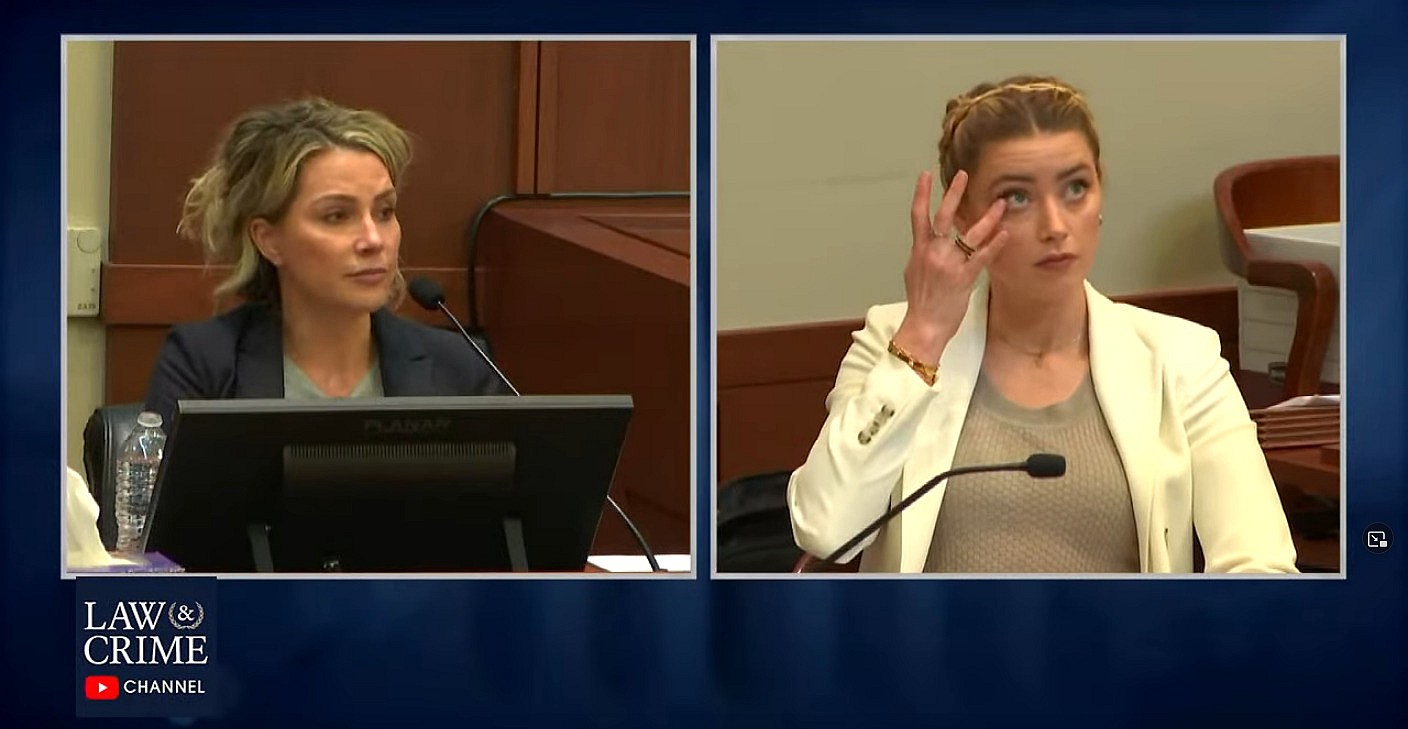Forensic Psychologist Offers Testimony That Amber Heard “Did Not Have PTSD,” Instead Showed Signs Of “Borderline And Histrionic Personality Disorders”

According to testimony given by clinical and forensic psychologist Doctor Shannon Curry, as part of Johnny Depp’s defamation trial against Amber Heard, various mental evaluations of the Aquaman actress found that she not only exhibited no signs of suffering from the post-traumatic stress disorder she claims to have developed due to her ex-husband’s alleged abuse, but also exhibited signs of both borderline and histrionic personality disorders.

Taking the stand in Fairfax, VA on April 25th, Dr. Curry opened her testimony [01:17:02], beginning with questioning from Depp’s legal team, by laying out her role in the case and explaining to the court that she had been “retained by Depp’s legal team” for her “specialized training working with post-traumatic stress disorder, traumatic stress.”
“Initially,” said Dr. Curry, “my role, that I understood at the time, was to review the case materials and provide my opinions regarding anything that I noticed that was consistent or even inconsistent with the psychological science that exists today on intimate partner violence in Mr. Depp and Ms. Heard’s relationship.”
She further noted that her role had evolved over time, as she “was retained at the end of Jan 2021, and then had just barely begun to review the documents, the case was postponed, and then in October 2021, I was asked by counsel to provide a psychological evaluation of Ms. Heard.”

Asked to provide details on what materials and information she relied upon for said evaluation, Dr. Curry proceeded to detail that the documents she reviewed “included all of the case documents, Ms. Heard’s medical records by Dr. [David] Kipper, her prior mental health treatment records, I believe I reviewed records from Dr. Amy Banks, Dr. Bonnie Jacobs, Dr. Connell Cowan, and also a significant portion of my review involved notes from Nurse Erin Falati, at the time Erin Boerum, who spent a significant time with Ms. Heard in her direct company.”

“I also reviewed exhibits,” she continued. “Quite a few audio recordings, a video recording – several video recordings or possibly photographs, I might be getting them confused, and multiple witness statements, testimony, and declarations.”
Dr. Curry additionally noted [1:33:00] that she had also spent roughly “12 hours” with Heard conducting in-person evaluations, at the end of which she found that “the results of Ms. Heard’s evaluations supported two diagnoses: borderline personality disorder and histrionic personality disorder.”

“Personality is something we take for granted, but these are the traits, the characteristics, the way we think, we feel, and we act that make us who we are,” she informed the court. “A personality disorder is some sort of dysfunction in those enduring traits.”
Turning briefly to her methodology, Dr. Curry stated that of the numerous tests she used in reaching this conclusion, the most important was the second edition of the Minnesota Multiphasic Personality Inventory, or MMPI2, which “asks 567 questions or statements and the person either agrees or disagrees with them, how much the statement represents them.”

“The MMPI2 has a set of validity scales we call them, these are scales that measure really the truthfulness and accuracy with which a person is approaching the test,” said Dr. Curry. “They can tell us a lot about if somebody is, for instance, exaggerating. Are they elevating one of the scales that shows that they’re exaggerating on purpose? Are they exaggerating in a manner that’s more like a cry for help?”

RELATED: Judge Rules Amber Heard Allowed To Use Public Interest Laws As Defense In Johnny Depp’s Libel Suit
Pressed by Depp’s attorney for insight into what she was able to “learn about Ms. Heard from the result of the MMPI2,” [02:11:52] Dr. Curry asserted, “One of the primary things I learned was that she had a very sophisticated way of minimizing any personal problems.”

“Some of the primary characteristics,” she detailed, “were essentially externalization of blame, tending to have a lot of inner hostility that is attempted to be controlled, a tendency to be very self-righteous but to also deny that self-righteousness and to judge others critically against these sort of high standards for moral value, but also to deny doing that, essentially to claim that one is very non-judgmental and accepting and yet very full of rage really.”

“And these aren’t facts,” she offered as a small caveat. “But her scores essentially correlated, so they were consistent with other people who have obtained these scores who have been shown through many, many, many studies to have these very specific traits.”
Returning to the disorders themselves, Dr. Curry then told the court, “Borderline Personality Disorder is a disorder of stability, it’s instability. And it’s instability in personal relationships, it’s instability in their emotions, it’s instability in their behavior, and it’s instability in their sense of self and their identity, and that instability is really driven by this underlying terror of abandonment.”

“When somebody is afraid of being abandoned by their partner or by anybody else in their environment and they have this disorder they’ll make desperate attempts to prevent that from happening,” she said. “And those desperate attempts could be physical aggression, it could be threatening, it could be harming themselves, but these are behaviors that are usually very extreme and very concerning to the people around them.”

In regard to Histrionic Personality Disorder, Dr. Curry explained that, similarly to BPD, “a lot of the key features are going to be drama and shallowness” as well as an “underlying drive of avoiding abandonment.”
“Whereas BPD might have more of the visible reactivity if somebody seems to be leaving,” the doctor described, “with HPD what you’re going to see is extreme discomfort at not being the center of attention, extreme efforts to be the center of attention, and when they feel they are not the center of attention, you will see some strange things – making up stories to try to get attention, often taking on a victim or princess role, those two roles in particular are pretty consistent, seeking care taking.”

RELATED: Johnny Depp Says “No One Is Safe” From Cancel Culture: “It Takes One Sentence”
Further questioned as to whether she was able to form any other “opinion about Ms. Heard’s mental status” (2:41:00) in light of her testing, Dr. Curry stated, “In addition to looking for Ms. Heard’s general mental status, any psychological issues that were present, I very specifically was assessing to determine whether post-traumatic stress disorder was present, and it was not.”

Once again showing her work, she proceeded to tell the court that she was able to make that determination after reviewing, “The interview, the review of the data, the case records, other people’s testimony, her treatment records, and then I also conducted in addition to the MMPI2 and looking at that data, I also conducted the Clinician Administered PTSD Scale (CAPS 5) which is the gold standard PTSD assessment, developed by the national center for PTSD, shown to be valid and accurate for use not just with service members but also with civilians, men, women, all genders, and also all ethnicities, and also specifically for use in a courtroom setting.”

Taking all of this into consideration, Dr. Curry stated that she ultimately determined [2:42:41] that “Ms. Heard did not have PTSD and there were pretty significant indications that she was grossly exaggerating symptoms of PTSD when asked about them.”

“There are 20 kind of ‘core symptoms’ that somebody might, can manifest with PTSD,” she said. “You don’t have to have all of them. Ms. Heard initially said that she had – in the first question [relating to a given symptom] you say “do you ever have this” before you get to the more nuanced follow-up questions. When I asked that first question on each item, she initially said ‘Yes I have that’ to 19 of the 20 symptoms.”

“That’s not typical even of somebody with the most disabling form of PTSD,” Dr. Curry concluded. “When we eventually sort of dialed it down, she had three remaining symptoms, and having symptoms of any disorder is common for all of us. Some of us struggle with sleep, some of us get anxious. It could be several different disorders, it could just be that you have this struggle in your life.”
These three specific symptoms, she said, were “sleep disturbance,” a startle response wherein “she gets startled or surprised and she tends to stay in sort of a hyper-startled mode for awhile,“ and “recurring nightmares.”

Interestingly, as her time on the stand drew to a close, Dr. Curry pushed back against definitive assertions made by other mental health experts in support of Heard’s claims.
Under cross-examination by Heard’s attorney, Elaine Bredehoft, the doctor was asked whether she recalled “Dr. [Connell] Cowan testifying, in that deposition you were present for, referring to Mr. Depp, ‘his controlling nature, jealousy and suspiciousness, addiction to drugs and alcohol and violent and indulgent temper.’ Do you recall him using those terms to describe Mr. Depp?”
“I remember thinking that would be an inappropriate impression for a treating provider of a different person to give,” she replied. “but I do recall him making that statement.”

Moments later, Bredehoft would similarly inquire as to whether Dr. Curry recalled “Dr. [Amy] Banks saying that she was not surprised that Amber was seeking a restraining order because of the violence that she knew existed in the relationship?”, prompting the witness to offer another point of criticism.
“I do recall that,” she said. “And it would be impossible to know that violence exists as a treating therapist or as a psychologist. Again we’re not investigators.”

What do you make of Dr. Curry’s testimony? Let us know your thoughts on social media or in the comments down below!
